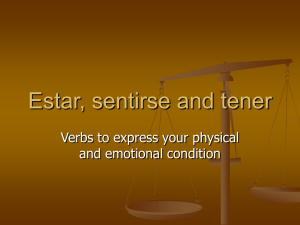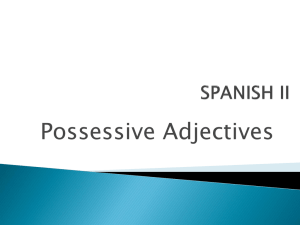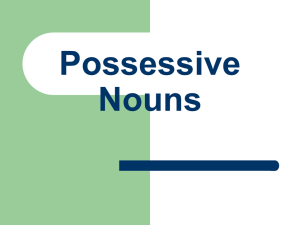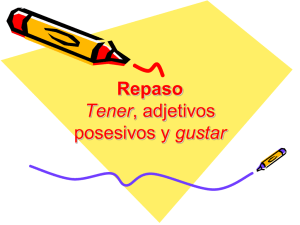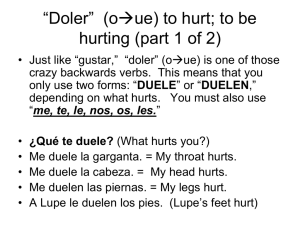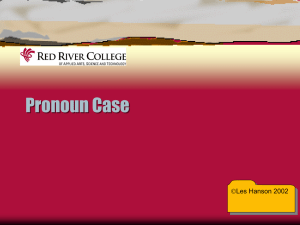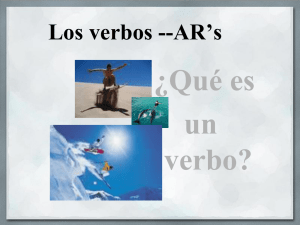cumpleaños.
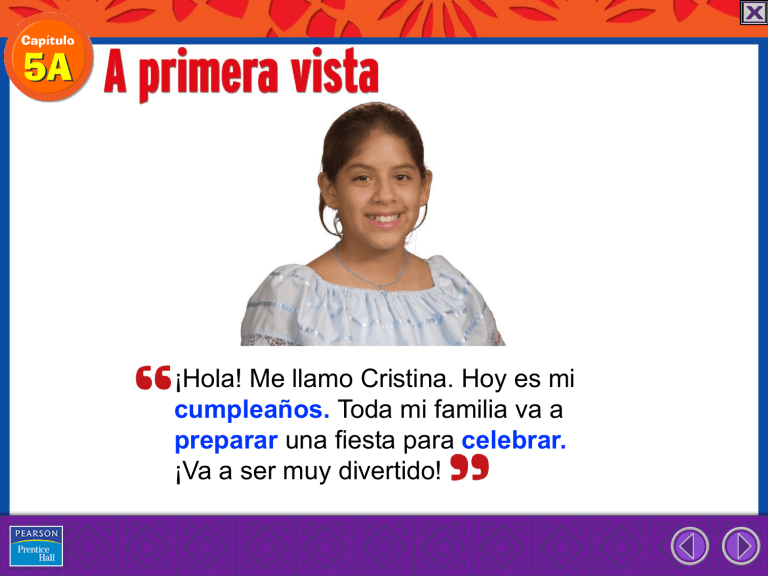
¡Hola! Me llamo Cristina. Hoy es mi cumpleaños. Toda mi familia va a preparar una fiesta para celebrar.
¡Va a ser muy divertido!
Aquí está mi familia. Tengo dos hermanos: mi hermana mayor, Angélica, que tiene
16 años, y mi hermano, Esteban, que tiene
15 años. Y aquí están mis primos: Carolina tiene 17 años. Su hermano menor, Gabriel, tiene sólo 13 años.
Mira a las personas de las fotos. Es la familia de mi tía Josefina. Mi tío Andrés es el esposo de Josefina. Ellos tienen dos hijos: su hijo Gabriel y su hija Carolina.
Hoy es el cumpleaños de Cristina. Tengo un regalo para ella. Es una cámara.
A Cristina le encanta sacar fotos.
¡Feliz cumpleaños!
¿Qué pasa en la fiesta de
Cristina? Lee la historia.
¡Feliz cumpleaños!
1 Esteban: Vamos a hacer un video. Uno . . . dos . . .
tres . . . ¡Acción!
Angélica: Hola, me llamo
Angélica. Hoy es el cumpleaños de nuestra hermana, Cristina. Todos están aquí para celebrar.
¡Feliz cumpleaños!
2 Angélica: Aquí están mis abuelos. ¿Y cuántos años tienen Uds.?
Abuelo: Pues, yo tengo sesenta y ocho años y tu abuela . . .
Abuela: Por favor, Ricardo.
Angélica, ¡qué pregunta!
¡Feliz cumpleaños!
3 Angélica: Aquí está Gabriel, mi primo menor. Le gusta mucho el fútbol. Y aquí está mi prima. ¿Cómo te llamas?
Carolina: Pero, Angélica, tú sabes mi nombre.
Angélica: Sí, pero es para el video. Por favor . . .
¡Feliz cumpleaños!
4 Angélica: Él es nuestro padre. ¿Qué haces, papá?
Padre: Voy a preparar unas hamburguesas y después voy a sacar fotos de la fiesta.
¡Feliz cumpleaños!
5 Angélica: Aquí está mi madre. A mamá le gustan las decoraciones.
Madre: Sí. A mí me encanta decorar con papel picado.
¡Feliz cumpleaños!
6 Angélica: Y aquí está
Cristina. Hoy es su cumpleaños. ¡Feliz cumpleaños!
Cristina: ¿Cuándo puedo abrir mis regalos?
Angélica: Ahora no.
Primero, la piñata.
¡Feliz cumpleaños!
7 Padre: ¡Vamos, Gabriel!
¿Puedes romper la piñata?
Gabriel: ¡Por supuesto!
Todos: Dale, dale, dale, no pierdas el tino, porque si lo pierdes, pierdes el camino.
(¡Crac! Gabriel rompe la piñata y . . . )
¡Feliz cumpleaños!
8 Madre: ¡Gabriel! ¡La piñata!
¡El pastel! ¡Ay, no!
The verb tener
The verb tener
The verb tener is used to show relationship or possession.
Tengo un hermano mayor.
Tenemos un regalo para Tere.
I have an older brother.
We have a gift for Tere.
Some expressions in Spanish use tener where English uses “to be.”
Mi primo tiene dieciséis años.
Tengo hambre y sed.
My cousin
I am is sixteen years old.
hungry and thirsty.
The verb tener
Here are all the present-tense forms of tener:
(yo)
(tú)
Ud.
(él)
(ella) tengo tienes tiene
(nosotros)
(nosotras)
(vosotros)
(vosotras)
Uds.
(ellos)
(ellas) tenemos tenéis tienen
Possessive adjectives
Possessive adjectives
You use possessive adjectives to tell what belongs to someone or to show relationships.
In English, the possessive adjectives are my, your, his, her, its, our, and their.
Here are the possessive adjectives in Spanish: mi(s) nuestro(s) nuestra(s) tu(s) su(s) vuestro(s) vuestra(s) su(s)
Possessive adjectives
Like other adjectives, possessive adjectives agree in number with the nouns that follow them. Only nuestro and vuestro have different masculine and feminine endings.
mi cámar a mi s cámar as nuestr o abuel o nuestr os abuel os nuestr a hij a nuestr as hij as
Javier y yo con nuestra abuela
Possessive adjectives
Su and sus can have many different meanings: his, her, its, your, or their. To be more specific, you can use de + noun or pronoun.
sus flores = las flores de ella
Mis padres con su regalo sus regalos = los regalos de Javier y Carlos
The letters p, t, and q
In English the consonants p, t, q, and the hard c sound are pronounced with a little puff of air.
Hold a tissue loosely in front of your mouth as you say these English words.
You will notice that the tissue moves.
pan papa too tea comb case park take
The letters p, t, and q
Now say these Spanish words with the tissue in front of your mouth. Try to say the consonants so that there is no puff of air and the tissue does not move.
pan papá tú tía cómo queso parque taco
The letters p, t, and q
Try it out! Listen to this nursery rhyme.
Listen particularly for the p, t, and q sounds. Then repeat the rhyme.
Tortillitas para mamá, tortillitas para papá.
Las quemaditas, 1 para mamá, las bonitas, 2 para papá.
1 The burned ones 2 The pretty ones
Episodio 1
to talk about family members los abuelos el abuelo la abuela grandparents grandfather grandmother el esposo, la esposa husband, wife los hermanos brothers; brother(s) and sister(s) el hermano la hermana brother sister el hermanastro la hermanastra los hijos el hijo la hija stepbrother stepsister children; sons son daughter
to talk about family members los padres (papás) el padre (papá) la madre (mamá) el padrastro la madrastra los primos el primo la prima los tíos el tío la tía parents father mother stepfather stepmother cousins
(male) cousin
(female) cousin uncles; aunt(s) and uncle(s) uncle aunt
to discuss and compare ages
¿Cuántos años How old is ____/ are ____?
tiene(n) ____?
Tiene(n) ____ años. He / She is / They are ____ (years old).
mayor pl. mayores older
menor pl. menores younger
to talk about people la persona to name animals el gato el perro person cat dog to discuss what someone likes
(a + person ) le gusta(n) / le encanta(n) he / she likes / loves
to describe activities at parties abrir celebrar decorar las decoraciones hacer un video el video preparar romper sacar fotos la foto la cámara to open to celebrate to decorate decorations to videotape video to prepare to break to take photos photo camera
to discuss celebrations el cumpleaños
¡Feliz cumpleaños! los dulces
la flor pl. las flores el globo
la luz pl. las luces el papel picado el pastel la piñata el regalo other useful words que sólo birthday
Happy birthday!
candy flower balloon light cut-paper decorations cake piñata gift, present who, that only
to indicate possession or relationship
tener to have tengo tienes tenemos tenéis tiene tienen
to indicate possession or relationship possessive adjectives mi(s) my tu(s) your su(s) your (formal), his, her, its nuestro(s), -a(s) our vuestro(s), -a(s) your (pl.) su(s) your (pl.), their
